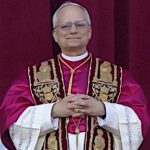Address of Pope Leo to the Media
Paul VI Hall – Monday, 12 May 2025
“Blessed are the peacemakers”
Good morning and thank you for this wonderful welcome!
They say when they clap at the beginning it doesn’t matter,
if you are still awake at the end and you still want to applaud…thank you very much!
Brothers and sisters,
I welcome you, representatives of the media from all over the world.
Thank you for the work you have done and continue to do in these days, which are truly a time of grace for the Church.
In the Sermon on the Mount, Jesus proclaimed: “Blessed are the peacemakers” (Mt 5:9).
This is a beatitude that challenges us all, but it is particularly relevant to you, calling each one of you to strive for a different kind of communication, one that does not seek consensus at all costs, does not use aggressive words, does not follow the culture of competition and never separates the search for truth from the love with which we must humbly seek it.
Peace begins with each one of us: in the way we look at others, listen to others and talk about others.
In this sense, the way we communicate is of fundamental importance: we must say “no” to the war of words and images, we must reject the paradigm of war.
Today, therefore, I want to reiterate the Church’s solidarity with journalists who are imprisoned because they seek to report the truth, and with these words I also ask for the release of these imprisoned journalists.
The Church recognizes in these witnesses – I am thinking of those who report on war even at the cost of their lives – the courage of those who defend dignity, justice and the right of people to be informed, because only informed individuals can make free choices.
The suffering of these imprisoned journalists challenges the conscience of nations and the international community and calls us all to safeguard the precious gift of freedom of expression and of the press.
Thank you, dear friends, for your service to the truth.
You have been in Rome in recent weeks to report on the Church, its diversity and, at the same time, its unity.
You were present during the liturgies of Holy Week and then reported on the sadness felt over the death of Pope Francis, which nevertheless took place in the light of Easter.
That same Easter faith drew us into the spirit of the Conclave, during which you worked long and tiring days.
But, even on this occasion, you managed to tell of the beauty of Christ’s love that unites us and makes us one people, guided by the Good Shepherd.
We live in times that are as difficult to navigate as they are to describe.
They are a challenge for all of us but not one that we should run away from.
On the contrary, they demand that each one of us, in our various roles and ministries, never give in to mediocrity.
The Church must face the challenges of the times.
In the same way, communication and journalism do not exist outside of time and history.
St Augustine reminds us of this when he says: “Let us live well and the times will be good.
We are the times” (Discourses 80.8).
Thank you, therefore, for what you have done to go beyond the stereotypes and clichés through which we often interpret Christian life and the life of the Church itself.
Thank you for capturing the essence of who we are and communicating it to the whole world through every possible medium.
Today, one of the most important challenges is to promote communication that can bring us out of the “Tower of Babel” in which we sometimes find ourselves, out of the confusion of unloving languages that are often ideological or partisan.
That is why your service, with the words you use and the style you adopt, is crucial.
As you know, communication is not only the transmission of information, but it is also the creation of a culture, of human and digital environments that become spaces for dialogue and discussion.
If you look at the way technology is developing, this mission is becoming more and more necessary.
I am thinking in particular of artificial intelligence, with its immense potential.
It requires responsibility and discernment to ensure that it can be used for the benefit of humanity as a whole. This responsibility concerns everyone according to their age and their role in society.
Dear friends, we will get to know each other better as time goes on.
We have had – we can say together – truly special days.
We have shared them through all forms of media: TV, radio, internet, and social media.
I sincerely hope that each of us can say that these days have revealed a little of the mystery of our humanity and left us with a desire for love and peace.
For this reason, I repeat to you today the invitation made by Pope Francis in his message for this year’s World Day of Social Communications: let us disarm communication of all prejudice and resentment, fanaticism and even hatred; let us free it from aggression.
We do not need loud, forceful communication, but rather communication that is capable of listening and of gathering the voices of the weak who have no voice.
Let us disarm words and we will help to disarm the world.
Disarmed and disarming communication allows us to share a different view of the world and to act in a manner consistent with our human dignity.
You are at the forefront of reporting on conflicts and peace aspirations, on situations of injustice and poverty, and on the silent work of so many people striving to create a better world.
For this reason, I ask you to choose the path of communication for peace consciously and courageously.
Thank you all and may God bless you!


